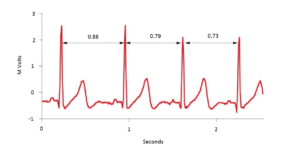Have Consistent Physiological Responses to Differing Circumstances with Mindfulness
By John M. de Castro, Ph.D.
“Heart rate variability differs from basic heart rate tracking that measures beats per minute in that it actually measures the time variance between heartbeats. With this heart rate variability, you can actually get a good picture of the resilience of the heart organ, which is a good predictor of both well-being and longevity.” – Kyle Pearce
In our lives we are confronted with a variety of situations and environments. In order to successfully navigate these differing situations, we must be able to adapt and self-regulate. The Autonomic Nervous System (ANS) is designed to adapt physiologically to the varying demands on us. It is composed of 2 divisions; the sympathetic division underlies activation, including increases in heart rate and blood pressure, while the parasympathetic division underlies relaxation, including decreases in heart rate and blood pressure. A measure of the balance between these systems is provided by the variability of the heart rate.
Heart Rate Variability (HRV) refers to the change in the time intervals between consecutive heart beats. Higher levels of HRV are indicative of flexibility in the Autonomic Nervous System and are associated with adaptability to varying environments. Mindfulness has been associated with a psychological flexibility and a greater ability to adapt appropriately to differing situations. It makes sense then to investigate the relationship of mindfulness to and Heart Rate Variability (HRV).
In today’s Research News article “Trait Mindfulness Is Associated With the Self-Similarity of Heart Rate Variability.” (See summary below or view the full text of the study at: https://www.frontiersin.org/articles/10.3389/fpsyg.2019.00314/full?utm_source=F-AAE&utm_medium=EMLF&utm_campaign=MRK_925884_69_Psycho_20190305_arts_A ), Sun and colleagues recruited college students and had them complete a measures of mindfulness. The students were also measured for heart rate variability (HRV) under 4 3-minute conditions, “a calming phase, a mental arithmetic task, a recovery phase, and mindfulness practice.”
They found that the participants level of mindfulness was not significantly associated with any direct measures of heart rate variability. Rather, mindfulness was associated with the consistency of heart rate variability between the response on different tasks. Hence, students high in mindfulness tended to have heart rate variability responses in the different phases that were very similar. In other words, heart rate variability during calming, mental arithmetic, and mindfulness practice were very consistent.
These results are correlational and as such conclusions about causation cannot be reached. But it can be speculated that mindfulness keeps the responses of the autonomic nervous system consistent making it easier to cope with varying circumstances. This level consistent responding may promote health and well-being. This suggests that greater focus on what is happening in the moment (mindfulness) may promote the ability to regulate one’s physiological responses and thereby to adapt to differing circumstances.
So, have consistent physiological responses to differing circumstances with mindfulness.
“Meditation is one technique that may help improve Heart Rate Variability (HRV) in both the short term and long-term. The end goal is not just to increase HRV, but it is to help the body better recover from stress related damages.” – Sam Sly
CMCS – Center for Mindfulness and Contemplative Studies
This and other Contemplative Studies posts are also available on Google+ https://plus.google.com/106784388191201299496/posts and on Twitter @MindfulResearch
Study Summary
Sun S, Hu C, Pan J, Liu C and Huang M (2019) Trait Mindfulness Is Associated With the Self-Similarity of Heart Rate Variability. Front. Psychol. 10:314. doi: 10.3389/fpsyg.2019.00314
Previous studies have linked trait mindfulness with better self-regulation and adaptation. Heart rate variability (HRV) is a good physiological indicator of the capacity for self-regulation and adaptation. The present study explored the relationship between trait mindfulness and HRV from the viewpoint of crosstalking between different HRV parameter pairs, which would reflect the dynamic interactions between each pair of HRV parameters in different processes. We measured the trait mindfulness of seventy-four undergraduate students and recorded nine HRV parameters during the following four consecutive experimental phases: (1) calming phase, (2) mental arithmetic task phase, (3) recovery phase, and (4) mindfulness practice phase. The relationship between trait mindfulness and HRV was explored at the following three levels: (1) the absolute level, i.e., HRV parameters in four different states, (2) the difference-change level, i.e., differences in HRV parameters between different states, and (3) the crosstalking level, i.e., self-similarity of crosstalking HRV parameter pairs. The results supported the following hypothesis: trait mindfulness, as measured by the Mindful Attention Awareness Scale (MAAS), was significantly and positively correlated with the self-similarity of crosstalking HRV parameter pairs but was not significantly correlated with the HRV parameters at the difference-change and absolute levels. These findings indicate that as trait mindfulness increases, the ability to maintain ANS function homeostasis improves.
HIGHLIGHTS
– Trait mindfulness is associated with better self-regulation and adaptation.
– Heart rate variability (HRV) is a good physiological indicator of the capacity for self-regulation and adaptation.
– Trait mindfulness is significantly correlated with self-similarity of crosstalking HRV parameter pairs but not with the HRV parameters at the difference-change or absolute levels.
